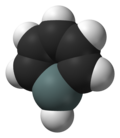| Revision as of 04:52, 25 December 2011 editCheMoBot (talk | contribs)Bots141,565 edits Updating {{chembox}} (no changed fields - added verified revid - updated 'DrugBank_Ref', 'UNII_Ref', 'ChEMBL_Ref', 'ChEBI_Ref', 'KEGG_Ref', 'CASNo_Ref') per Chem/Drugbox validation (report [[Wikipedia_talk:WikiProject_Chemicals|er...← Previous edit | Revision as of 16:19, 18 February 2012 edit undoWhoop whoop pull up (talk | contribs)Extended confirmed users35,170 edits →See alsoNext edit → | ||
| Line 50: | Line 50: | ||
| ==See also== | ==See also== | ||
| * |
* 6-membered aromatic rings with one carbon replaced by another group: ], ], ], ], '''stannabenzene''', ], ], ], ] | ||
| ==References== | ==References== | ||
Revision as of 16:19, 18 February 2012
| |||

| |||
| Names | |||
|---|---|---|---|
| IUPAC name Stannine | |||
| Other names Stannin | |||
| Identifiers | |||
| CAS Number | |||
| 3D model (JSmol) | |||
| ChemSpider | |||
| CompTox Dashboard (EPA) | |||
InChI
| |||
SMILES
| |||
| Properties | |||
| Chemical formula | C5H6Sn | ||
| Molar mass | 184.813 g·mol | ||
| Except where otherwise noted, data are given for materials in their standard state (at 25 °C , 100 kPa).
| |||
Stannabenzene (C5H6Sn) is the parent representative of a group of organotin compounds that are related to benzene with a carbon atom replaced by a tin atom. Stannabenzene itself has been studied by computational chemistry, but has not been isolated.
Stable derivatives of stannabenzene
Stable derivatives of stannabenzene are have been isolated. The 2-stannanaphthalene depicted below is stable in an inert atmosphere at temperatures below 140 °C. The tin to carbon bond in this compound is shielded from potential reactants by two very bulky groups, one tert-butyl group and the even larger 2,4,6-trisphenyl or Tbt group. The two Sn-C bonds have bond lengths of 202.9 and 208.1 pm which are shorter than those for Sn-C single bonds (214 pm) and comparable to that of known Sn=C double bonds (201.6 pm). The C-C bonds show little variation with bond lengths between 135.6 and 144.3 pm signaling that this compound is aromatic.
Tbt-substituted 9-stannaphenanthrene was reported in 2005 . At room temperature it forms the cycloadduct.
Tbt-substituted stannabenzene was reported in 2010.. At room-temperature it quantitatively forms the DA dimer.

Tbt-substituted stannabenzene synthesis. Reagents lithium aluminum hydride (step 2), NBS (step 3), LDA (step 4)
See also
- 6-membered aromatic rings with one carbon replaced by another group: borabenzene, benzene, silabenzene, germabenzene, stannabenzene, pyridine, phosphorine, arsabenzene, pyrylium salt
References
- Ebrahimi, Arash Afshar; Ghiasi, Reza; Foroutan-Nejad, Cina (2010). "Topological characteristics of the ring critical points and the aromaticity of groups IIIA to VIA hetero-benzenes". Journal of Molecular Structure: THEOCHEM. 941 (1–3): 47–52. doi:10.1016/j.theochem.2009.10.038.
{{cite journal}}: CS1 maint: multiple names: authors list (link) - Mizuhata, Yoshiyuki; Sasamori, Takahiro; Takeda, Nobuhiro; Tokitoh, Norihiro (2006). "A Stable Neutral Stannaaromatic Compound: Synthesis, Structure and Complexation of a Kinetically Stabilized 2-Stannanaphthalene". Journal of the American Chemical Society. 128 (4): 1050–1. doi:10.1021/ja057531d. PMID 16433501.
{{cite journal}}: no-break space character in|title=at position 42 (help) - Generation of 9-Stannaphenanthrene and Its Reactivities Yoshiyuki Mizuhata, Nobuhiro Takeda, Takahiro Sasamori and Norihiro Tokitoh Chemistry Letters Volume 34 Number 8 Year 2005 Page 1088 doi:10.1246/cl.2005.1088
- Generation of Stannabenzenes and Their Properties Yoshiyuki Mizuhata, Naoya Noda, and Norihiro Tokitoh Organometallics, 2010, 29 (21), pp 4781–4784 doi:10.1021/om100382n


